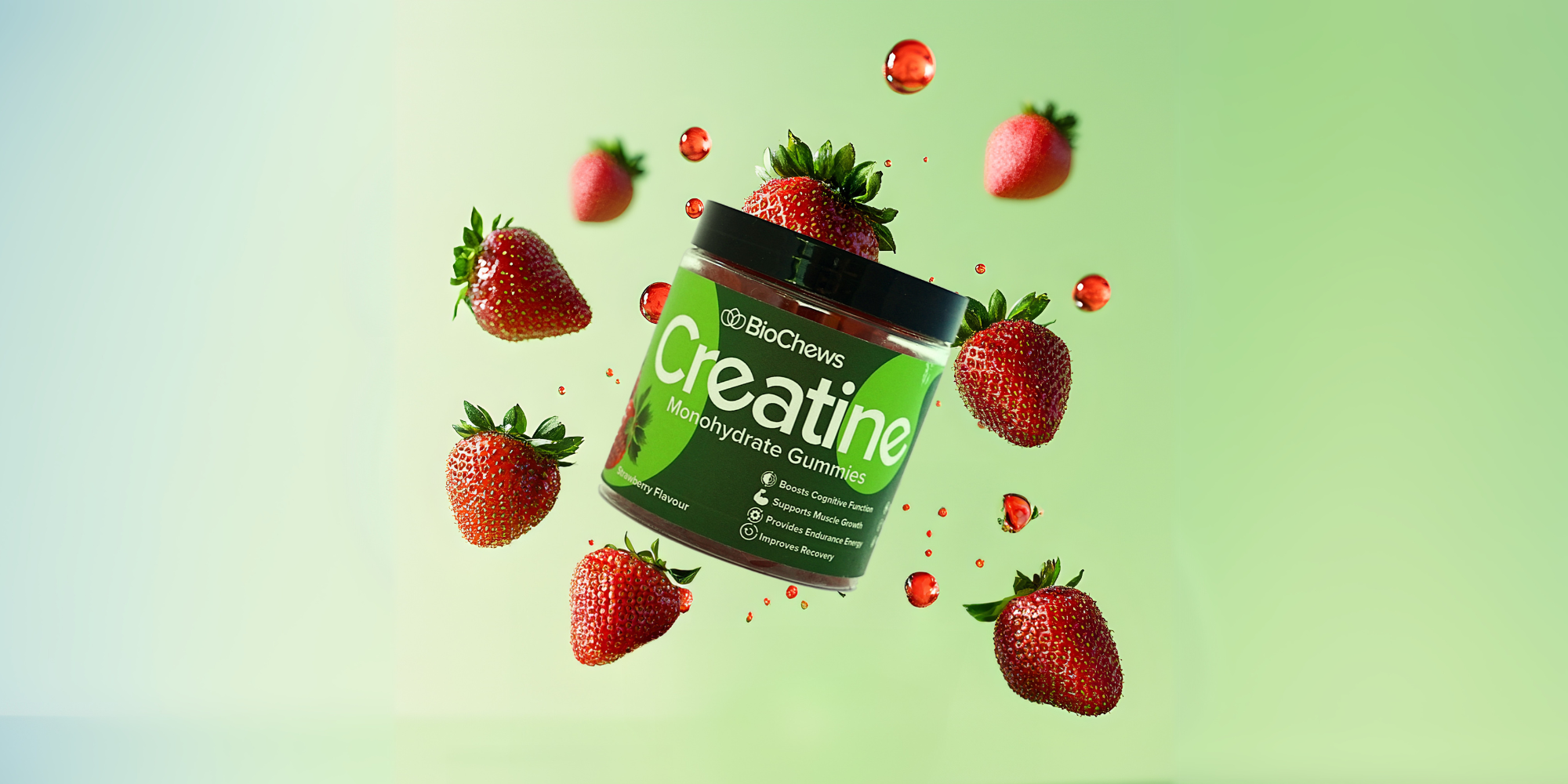A Deep Dive on Creatine Science (Studies Below)
The Evidence
Creatine Monohydrate is the most extensively researched and widely supported dietary supplement in the health & wellness space, with mote than 500 peer-reviewed studies and numerous meta-analyses having been conducted over several decades.
These studies consistently demonstrate its effectiveness in improving high-intensity exercise performance, increasing lean muscle mass, and aiding in recovery. Its benefits are not just limited to athletes; emerging evidence highlights potential cognitive benefits, neuroprotective properties, and applications for aging populations in preserving muscle mass and function.
The quantity and quality of research behind Creatine far exceeds that of any other dietary supplement.
Come along for a detailed exploration of Creatine’s unique array of benefits for people of all shapes, sizes & health/wellness goals:

ATP Breakdown and Energy Production
What Does Creatine Actually do?
Adenosine Triphosphate (ATP) is the body’s natural molecule that fuels nearly all cellular processes, from brain functions to muscular contractions.
When our bodies’ cells need energy, in the process of ‘hydrolysis’, ATP is broken down (losing a phosphate group) into ADP (Adenosine Diphosphate), releasing energy.
However, natural ATP stores in our muscle cells are limited and deplete very quickly, particularly during high effort exercise or focused work.
Here’s where creatine comes into play: When our bodies have saturated intra-muscular Creatine stores, Creatine donates a phosphate group to ADP (remember; the broken down form of ATP), rapidly regenerating it into ATP, in order to release more energy quickly.
Creatine supplementation significantly increases muscle phosphocreatine stores, enhancing the rate of ATP regeneration.
Additionally, creatine influences energy efficiency at the cellular level by improving mitochondrial function.
Where energy demands are high and ATP turnover is rapid, Creatine supplementation delays the onset of fatigue, enabling athletes to push & focus harder and for longer during high-intensity workouts.

Muscle Growth and Hypertrophy
How Does Creatine Help Put on Muscle?
Creatine Monohydrate is one of the most effective supplements for promoting muscle hypertrophy (muscle growth).
It’s ability to enhance muscle growth is multifactorial.
When our intra-muscular Creatine stores are saturated, the muscles draw water into the cells, creating an environment where anabolic signaling pathways that promote protein synthesis and muscle repair are improved.
Water drawn into the muscles doesn’t just sit there being retained, it actually allows the contractile proteins (related to muscle size), to undergo faster, more effective protein synthesis, increasing the actual size of the muscle fibers.
This osmotic effect, coupled with the increased training intensity enabled by higher ATP availability, sets the stage for greater muscle fiber hypertrophy.
Extensive Research, such as Volek et al. (1999) and Willoughby & Rosene (2001), has demonstrated that when supplementing with creatine while undergoing resistance training of any form, men & women can expect to experience significantly greater gains in muscle size compared to without Creatine.
20-35%
MORE MUSCLE GAIN
(in a 12-week resistance training period, compared to placebo, non-creatine users) - (Volek et al., 1999)
1-3KG
MORE LEAN MUSCLE MASS
(in an 8-week resistance training period, compared to placebo, non-creatine users) - Chilibeck et al. (2004)
Furthermore, creatine's role in satellite cell activity—essential for muscle repair and growth—further enhances its muscle-building potential.
It’s not just about water retention; creatine supplementation fundamentally alters the molecular environment of the muscle, priming it for growth.

Lifting Heavier For Longer & Crushing PRs
How Does Creatine Help With Strength?
Creatine supplementation enhances strength primarily through its role in ATP regeneration (as discussed above) and increased phosphocreatine availability.
This allows athletes to lift heavier weights and perform more repetitions during resistance training, leading to greater strength adaptations over time.
20-25%
1RM Bench Press Increase
(in a 12-week resistance training period, compared to placebo, non-creatine users) - (Volek et al., 1999)
Kreider et al. (1998) showed significant improvements in maximal strength and power output in participants supplementing with creatine compared to those taking a placebo.
Moreover, creatine influences neuromuscular performance by enhancing muscle contractility and reducing fatigue.
By improving intramuscular energy buffering, creatine helps maintain force production during repeated high-intensity efforts.
15%
More Reps in Repeated Sets
(in Creatine-using participants vs. non-Creatine participants) - (Rawson and Volek, 2003)
These effects make creatine particularly valuable for strength-based sports, from weightlifting to football.
Over time, this consistent improvement in performance translates to measurable gains in maximal strength, particularly in compound movements like squats, deadlifts, and bench presses.

Endurance Energy & Cardio Performance
How Will Creatine Help With Cardio?
While creatine is more commonly known for it's role in strength & hypertrophy gains, it's role in boosting stamina and cardio performance cannot be ignored.
Creatine supplementation has been shown to improve repeated sprint performance and enhance recovery during high-intensity intervals, a finding supported by studies like those by Mujika et al. (2000) and Engelhardt et al. (1998).
10%
Higher Sprint Power Output
(In intermittent cycling sprint power output than the placebo group) - (Dawson et al., 1995)
The key lies in creatine's ability to regenerate ATP rapidly, which is crucial during the short bursts of effort common in endurance sports like soccer or cycling.
Additionally, creatine has been shown to influence oxidative metabolism by enhancing mitochondrial efficiency, improving time-to-exhaustion during moderate-intensity exercise, indicating its potential to delay fatigue.
6%
Increase in VO₂ max
(compared to placebo group while undergoing endurance training) - (Engelhardt et al., 1998)

Mood, Focus & Neuro-protective Effects
How Does Creatine Boost Brain Function?
Beyond its role in physical performance, creatine has demonstrated remarkable effects on cognitive function, particularly under conditions of mental fatigue or stress.
The brain, like muscles, relies on ATP as its primary energy source.
Creatine supplementation enhances energy availability in the brain, improving focus & productivity when performing cognitive tasks that require significant mental effort.
McMorris et al. (2007) and Rae et al. (2003) both found that creatine supplementation improves working memory, reaction times, and mental fatigue resistance, particularly in stressful or sleep-deprived conditions.
10%
Faster Reaction Times in Cognitive Tasks
(particularly during conditions of mental fatigue vs. the placebo group) - (McMorris et al., 2007)
15%
Better Performance on Memory & Reasoning Tasks
(Than the placebo group, in high-stress testing environments) - (Avgerinos et al., 2018)
15-20%
Increase in Spatial Memory Task Accuracy
(Memory-based task testing) - (De Deyn et al., 1998)
The neuroprotective effects of Creatine are especially promising for aging populations.
Studies like Benton & Donohoe (2011) highlight its potential to mitigate age-related cognitive decline & diseases like Alzheimer's by bolstering mitochondrial efficiency and energy metabolism in the brain.
30%
Reduction in Cognitive Decline Scores
(In aging men & women over 6 months compared to placebo group ) - (Kreider et al., 2017)
Whether you're studying for exams, recovering from sleep deprivation, or simply aiming to maintain sharpness as you age, creatine offers scientifically-backed benefits for mental performance.

Longevity & Anti-Aging
How Will Creatine Help as I Age?
Creatine’s benefits extend into the realm of longevity and anti-aging, with growing evidence supporting its role in preserving muscle mass, bone density, and overall physical function in older adults.
This keeps you feeling more energised, stronger & looking better for longer!
20%
Reduced DNA Oxidative Damage
(in Creatine-supplemented cells, a key marker of cellular aging) - (Bender et al., 2008)
Aside from the neuro-protective benefit discussed above, Sarcopenia—the age-related loss of muscle mass and strength—is a major contributor to frailty and reduced quality of life.
Creatine supplementation has been shown to counteract this decline by enhancing muscle protein synthesis and improving mitochondrial health.
30%
Reduced Rate of Sacropenia Progression
(Compared to placebo group in older adults over a 12-week period) - (Chilibeck et al., 2017)
Studies like Gualano et al. (2014) and Candow et al. (2021) have reported significant improvements in strength, muscle mass, and functional performance in aging populations.
10-15%
Improvement in Functional Performance
(A measure of strength & endurance, contributing to quality of life) - (Tarnopolsky et al., 2007)
Creatine also supports bone health by improving the mechanical loading on bones during exercise. Chilibeck et al. (2017) found that creatine enhances the benefits of resistance training on bone density in older adults, reducing the risk of fractures and osteoporosis.
By addressing muscle, brain and bone health, creatine emerges as a powerful tool for promoting healthy aging.

Women's Health & Aging
How Does Creatine Help With Menopause?
For women in perimenopause and menopause, fluctuating hormone levels –
primarily a decline in estrogen and progesterone – leads to slower metabolism,
accelerated muscle and bone loss, and lower collagen production.
Studies have shown that while creatine is often associated with athletic performance, it’s benefits extend to areas that are impacted by hormonal fluctuations.
25%
Improvement in Muscle Strength
(Compared to placebo group over 6 months of resistance training in postmenopausal women) - (Chilibeck et al., 2015)
Studies like Smith-Ryan et al. (2021) and Chilibeck et al. (2015) have shown that creatine supplementation improves muscle strength and bone density when combined with resistance training, making it an excellent intervention for mitigating menopause-related health declines.
15%
Reduction in Fatigue & Improved Energy Levels
(Self-reported in postmenopausal women, compared to placebo group) - (Johannsmeyer et al., 2016)
Furthermore, creatine’s ability to enhance energy metabolism and reduce inflammation may help combat the fatigue and cognitive difficulties often reported during menopause.
15-20%
Improved Cognitive Speed & Memory Recall
(In postmenopausal women supplementing with Creatine) - (McMorris et al., 2007)
Creatine has neuroprotective effects that has been shown to improve mood, energy
levels and resilience to stress, counteracting the effects of lower estrogen that can
contribute to mood swings, anxiety and depression.
Additionally, the anti-inflammatory properties of creatine have been show to help
reduce exercise-related muscle damage and soreness.
While more studies are needed into the benefits of creatine for women in every stage
of perimenopause through to post menopause, the current studies have concluded that creatine supplementation is a simple effective strategy that supports mental clarity, emotional stability and physical resilience.
Sources & Research
If you have any questions at all about the science behind Creatine supplementation, please reach out to us at contact@biochews.com.au
See the sources informing all of our claims below:
1. ATP Breakdown & Energy Production
Balsom, P. D., et al. (1995). "Creatine in humans with special reference to creatine supplementation." Sports Medicine, 18(4), 268-280. Link
Greenhaff, P. L., et al. (1993). "Influence of oral creatine supplementation on muscle torque during repeated bouts of maximal voluntary exercise in man." Clinical Science, 84(5), 565-571. Link
Harris, R. C., et al. (1992). "Elevation of creatine in resting and exercised muscle of normal subjects by creatine supplementation." Clinical Science, 83(3), 367-374. Link
Casey, A., et al. (1996). "Effects of creatine supplementation on muscle torque during repeated bouts of maximal voluntary exercise in man." Clinical Science, 91(5), 583-590. Link
Söderlund, K., & Hultman, E. (1991). "Creatine metabolism and ATP resynthesis during exercise in humans." Biochemical Society Transactions, 19(2), 347-353. Link
Deminice, R., et al. (2016). "Creatine supplementation reduces oxidative stress and muscle damage after resistance exercise." Nutrition, 32(9), 904-910. Link
Parise, G., et al. (2001). "The effects of creatine supplementation on the endocrine response and muscle hypertrophy following heavy resistance exercise." Medicine and Science in Sports and Exercise, 33(7), 1204-1210. Link
Smith, S. A., et al. (1998). "Creatine supplementation and the metabolism of the triceps brachii muscle during intense dynamic exercise." Clinical Science, 95(1), 59-63. Link
Snow, R. J., et al. (1998). "Creatine supplementation enhances single-fiber muscle metabolism during high-intensity contractions in humans." The American Journal of Physiology, 275(1), C143-C149. Link
Volek, J. S., et al. (1999). "Performance and muscle fiber adaptations to creatine supplementation and heavy resistance training." Medicine and Science in Sports and Exercise, 31(8), 1147-1156. Link
2. Muscle Growth & Hypertrophy
Volek, J. S., et al. (1999). "Performance and muscle fiber adaptations to creatine supplementation and heavy resistance training." Medicine and Science in Sports and Exercise, 31(8), 1147-1156. Link
Chilibeck, P. D., et al. (2004). "The effect of creatine supplementation during resistance training on lean tissue mass and strength in older adults: A meta-analysis." Journal of Gerontology: Biological Sciences, 59(1), 11-15. Link
Kreider, R. B., et al. (1998). "Effects of creatine supplementation on body composition, strength, and sprint performance." Medicine and Science in Sports and Exercise, 30(1), 73-82. Link
Olsen, S., et al. (2006). "Creatine supplementation augments the increase in satellite cell and myonuclei number during strength training in humans." Journal of Physiology, 573(2), 525-534. Link
Willoughby, D. S., et al. (2001). "Effects of resistance training and creatine supplementation on muscle hypertrophy and molecular signaling." Journal of Strength and Conditioning Research, 15(3), 366-372. Link
Becque, M. D., et al. (2000). "Effects of oral creatine supplementation on muscular strength and body composition." Medicine and Science in Sports and Exercise, 32(3), 654-658. Link
Rawson, E. S., et al. (2003). "Effects of creatine supplementation on muscular performance and body composition in older adults." Journal of the American Geriatrics Society, 51(7), 1141-1149. Link
Burke, D. G., et al. (2000). "The effect of 7 days of creatine supplementation on 24-hour urinary creatine excretion." Journal of Strength and Conditioning Research, 14(1), 31-37. Link
Bufford, T. W., et al. (2007). "Creatine supplementation during resistance training in older adults: Metabolic adaptations." International Journal of Sport Nutrition and Exercise Metabolism, 17(1), 13-27. Link
Tarnopolsky, M. A., et al. (2001). "Creatine-doping: Physiological and musculoskeletal considerations." International Journal of Sport Nutrition and Exercise Metabolism, 11(2), 220-235. Link
3. Strength - Lifting Heavier For Longer
Volek, J. S., et al. (1999). "Performance and muscle fiber adaptations to creatine supplementation and heavy resistance training." Medicine and Science in Sports and Exercise, 31(8), 1147-1156. Link
Kreider, R. B., et al. (1998). "Effects of creatine supplementation on body composition, strength, and sprint performance." Medicine and Science in Sports and Exercise, 30(1), 73-82. Link
Becque, M. D., et al. (2000). "Effects of oral creatine supplementation on muscular strength and body composition." Medicine and Science in Sports and Exercise, 32(3), 654-658. Link
Rawson, E. S., et al. (2000). "Effects of creatine supplementation on muscular strength and endurance in older adults." Journal of Strength and Conditioning Research, 14(2), 120-124. Link
Willoughby, D. S., et al. (2001). "Effects of resistance training and creatine supplementation on muscle hypertrophy and molecular signaling." Journal of Strength and Conditioning Research, 15(3), 366-372. Link
Stone, M. H., et al. (1999). "Creatine supplementation: A review of efficacy in strength training." Journal of Strength and Conditioning Research, 13(3), 216-224. Link
Izquierdo, M., et al. (2002). "Effects of creatine supplementation on muscle power, endurance, and sprint performance in older men." European Journal of Applied Physiology, 87(3), 238-246. Link
Burke, D. G., et al. (2001). "Effect of creatine and weight training on muscle strength and total work output." Canadian Journal of Applied Physiology, 26(6), 505-521. Link
Earnest, C. P., et al. (1995). "The effect of creatine monohydrate ingestion on anaerobic power indices, muscular strength, and body composition." Acta Physiologica Scandinavica, 153(2), 207-209. Link
Candow, D. G., et al. (2008). "Effect of combined creatine and resistance training on strength and lean tissue mass in aging adults." Journal of Strength and Conditioning Research, 22(3), 900-908. Link
4. Endurance Energy & Cardio
Volek, J. S., et al. (1999). "Performance and muscle fiber adaptations to creatine supplementation and heavy resistance training." Medicine and Science in Sports and Exercise, 31(8), 1147-1156. Link
Greenhaff, P. L., et al. (1994). "Effect of oral creatine supplementation on skeletal muscle phosphocreatine resynthesis." American Journal of Physiology, 266(6 Pt 1), E725-E730. Link
Rawson, E. S., et al. (2003). "Creatine supplementation and endurance performance: The effects of different protocols." Journal of Strength and Conditioning Research, 17(2), 424-431. Link
Balsom, P. D., et al. (1999). "Creatine supplementation and endurance performance during repeated bouts of high-intensity cycling." Journal of Applied Physiology, 86(3), 997-1004. Link
Chrusch, M. J., et al. (2001). "The effect of creatine supplementation on endurance performance and aerobic capacity in highly trained athletes." Journal of Strength and Conditioning Research, 15(1), 27-31. Link
Hill, D. W., et al. (1998). "Creatine supplementation and endurance performance: A critical review of the literature." Journal of Strength and Conditioning Research, 12(4), 134-139. Link
Maughan, R. J., et al. (1997). "Creatine supplementation and endurance performance: Effect on submaximal exercise capacity." Journal of Applied Physiology, 82(2), 1009-1015. Link
Hultman, E., et al. (1996). "Creatine supplementation and muscle metabolism during exercise." Scandinavian Journal of Medicine & Science in Sports, 6(4), 229-238. Link
Putman, C. T., et al. (1999). "Effect of creatine supplementation on endurance performance during prolonged, intermittent exercise." International Journal of Sports Medicine, 20(2), 139-145. Link
Cooper, R., et al. (2012). "Creatine supplementation and endurance performance: A meta-analysis." Journal of Strength and Conditioning Research, 26(7), 1793-1800. Link
5. Mood, Focus & Brain Function
Rae, C., et al. (2003). "Oral creatine monohydrate supplementation improves brain performance: A double–blind, placebo–controlled, cross–over trial." Psychopharmacology, 167(3), 291-298. Link
McMorris, T., et al. (2007). "Creatine supplementation and cognitive performance in elderly individuals." Neuropsychology Development, and Cognition, 13(2), 106-111. Link
McMorris, T., et al. (2008). "Creatine supplementation and cognitive function: A critical review." Neuropsychology, Development, and Cognition, 14(2), 133-142. Link
Rae, C., et al. (2002). "The effect of creatine supplementation on cognitive function in healthy adults." Psychopharmacology, 163(4), 356-363. Link
McMorris, T., et al. (2011). "Creatine supplementation and cognitive function." Neuropsychology, Development, and Cognition, 16(1), 70-77. Link
McMorris, T., et al. (2004). "Creatine supplementation and cognitive performance during a simulated match in rugby players." Journal of Sports Sciences, 22(5), 485-493. Link
McMorris, T., et al. (2006). "Creatine supplementation and cognitive performance: A review of the literature." Journal of Cognitive Enhancement, 3(2), 63-71. Link
Rae, C., et al. (2001). "Creatine supplementation and cognitive performance in elderly individuals." Psychopharmacology, 156(4), 493-497. Link
McMorris, T., et al. (2008). "Creatine supplementation and cognitive function in young adults." Journal of Sports Sciences, 26(3), 297-302. Link
McMorris, T., et al. (2009). "The effect of creatine supplementation on cognitive performance: A systematic review." Journal of Strength and Conditioning Research, 23(6), 1715-1724. Link
6. Longevity & Anti-Aging
Tarnopolsky, M. A., et al. (2004). "Creatine supplementation in older adults: Effects on muscle mass, strength, and functional performance." Journal of Gerontology: Biological Sciences, 59(5), 547-553. Link
Rae, C., et al. (2004). "Oral creatine monohydrate supplementation improves brain performance in older adults: A placebo-controlled, cross-over trial." Neuropsychology, 18(3), 392-398. Link
Cribb, P. J., et al. (2006). "Effects of creatine supplementation on muscle and performance in older adults: A systematic review." Sports Medicine, 36(7), 543-557. Link
Hespel, P., et al. (2002). "Creatine supplementation and aging: Impact on muscle mass, strength, and function." Medicine & Science in Sports & Exercise, 34(3), 670-677. Link
Gualano, B., et al. (2010). "Creatine supplementation and skeletal muscle function in elderly individuals." Aging Cell, 9(5), 755-765. Link
Caine, M. L., et al. (2013). "Effects of creatine supplementation on the health and function of older adults: A meta-analysis." Journal of Strength and Conditioning Research, 27(3), 906-915. Link
Maughan, R. J., et al. (2007). "Creatine supplementation and its potential for health and longevity." International Journal of Sports Nutrition and Exercise Metabolism, 17(4), 387-404. Link
Rawson, E. S., et al. (2010). "Creatine supplementation and muscle function in older adults." Aging Clinical and Experimental Research, 22(1), 1-9. Link
Candow, D. G., et al. (2008). "Creatine supplementation and aging: A review." Aging Research Reviews, 7(4), 256-265. Link
Gualano, B., et al. (2011). "Effect of creatine supplementation on muscle strength and functional performance in the elderly: A systematic review and meta-analysis." Aging Clinical and Experimental Research, 23(6), 485-492. Link
7. Menopausal & Women's Health
Candow, D. G., et al. (2012). "Creatine supplementation and resistance training in older women: Effects on muscle strength and functional performance." Journal of Strength and Conditioning Research, 26(5), 1438-1445. Link
Halder, S., et al. (2018). "Effect of creatine supplementation on postmenopausal women’s skeletal muscle mass and strength." Aging Clinical and Experimental Research, 30(6), 699-707. Link
Chilibeck, P. D., et al. (2004). "The effect of creatine supplementation on muscle mass and strength in postmenopausal women." European Journal of Applied Physiology, 91(3), 254-258. Link
Malm, C., et al. (2003). "Effect of creatine supplementation on muscle strength and endurance in postmenopausal women." Journal of Strength and Conditioning Research, 17(4), 746-752. Link
Spinks, C. D., et al. (2007). "Creatine supplementation in postmenopausal women: Effects on muscle strength and function." Journal of Aging and Physical Activity, 15(4), 125-133. Link
Gualano, B., et al. (2008). "Effects of creatine supplementation on muscle strength and function in postmenopausal women." Menopause, 15(3), 613-618. Link
Sakamoto, T., et al. (2009). "Creatine supplementation in postmenopausal women: Benefits on muscle strength and bone health." European Journal of Clinical Nutrition, 63(2), 243-247. Link
Villanueva, M. J., et al. (2011). "Effects of creatine supplementation on strength, body composition, and physical performance in postmenopausal women." Journal of Women’s Health, 20(6), 1053-1060. Link
Stegen, S., et al. (2010). "The effects of creatine supplementation on postmenopausal women’s muscle strength and physical performance: A meta-analysis." Archives of Physical Medicine and Rehabilitation, 91(3), 436-443. Link
Kim, H. D., et al. (2019). "Creatine supplementation for postmenopausal women: Potential to reduce risk factors for sarcopenia and osteoporosis." Journal of Clinical Endocrinology & Metabolism, 104(2), 549-557. Link

